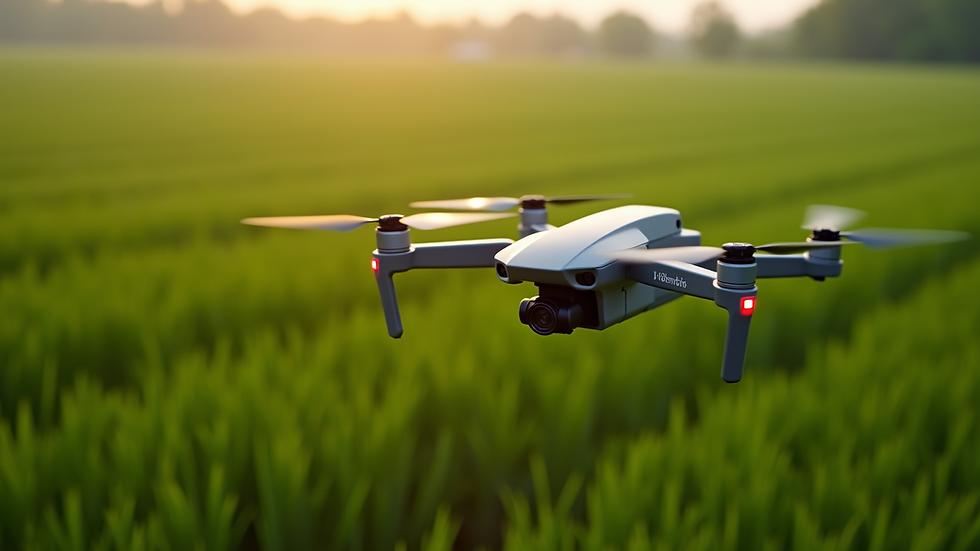Revolutionizing Farming with Advanced Agriculture Drones
- bvjanardhana
- Nov 6, 2025
- 3 min read
Farming is evolving fast. Technology now plays a key role in boosting productivity and sustainability. Among the most exciting innovations are advanced farming drones. These machines transform how we monitor crops, manage resources, and increase yields. I see a future where drones become essential tools for every farm.
How Advanced Farming Drones Change Agriculture
Drones bring precision and speed to farming tasks. They fly over fields, capturing detailed images and data. This helps farmers spot problems early, like pest infestations or water stress. Instead of walking acres or relying on guesswork, farmers get accurate insights instantly.
For example, drones equipped with multispectral cameras detect crop health by analyzing light reflected from leaves. This reveals nutrient deficiencies or disease before visible symptoms appear. Farmers can then apply fertilizers or pesticides only where needed, saving money and protecting the environment.
Drones also assist in irrigation management. They identify dry patches and uneven watering, allowing targeted irrigation. This reduces water waste and improves crop growth. With climate change impacting rainfall patterns, such precision is vital.

Benefits of Using Advanced Farming Drones
The advantages of drones in agriculture are clear and measurable:
Increased Efficiency: Drones cover large areas quickly, reducing labor and time.
Cost Savings: Targeted interventions cut down on chemicals and water use.
Better Crop Yields: Early detection of issues leads to timely action and healthier plants.
Sustainability: Reduced chemical runoff and optimized resource use protect soil and water.
Data-Driven Decisions: Farmers gain precise, real-time information to plan better.
These benefits align perfectly with the goals of modern Indian agriculture. Farmers face challenges like limited labor, rising input costs, and environmental concerns. Drones offer practical solutions to these problems.
Practical Applications of Advanced Farming Drones
Drones are versatile tools that support many farming activities:
Crop Monitoring
Regular drone flights provide up-to-date maps of crop conditions. This helps track growth stages and identify stressed areas.
Soil Analysis
Drones equipped with sensors assess soil health and moisture levels. This data guides fertilization and irrigation schedules.
Planting and Seeding
Some drones can even plant seeds in hard-to-reach areas, speeding up sowing and reducing manual labor.
Pest and Disease Control
Early detection through aerial imaging allows targeted pesticide application, minimizing chemical use.
Crop Spraying
Drones spray fertilizers and pesticides precisely, reducing waste and exposure risks.
Yield Estimation
By analyzing plant size and density, drones help predict harvest volumes, aiding market planning.

Choosing the Right Advanced Farming Drones
Selecting the best drone depends on farm size, crop type, and specific needs. Here are key factors to consider:
Flight Time and Range: Longer flight times cover more area per trip.
Payload Capacity: Important for spraying drones carrying liquids.
Camera and Sensor Quality: High-resolution and multispectral cameras provide better data.
Ease of Use: User-friendly controls and software simplify operations.
Durability and Support: Robust design and local service ensure reliability.
Indian farmers should look for solutions tailored to local conditions. Companies like Aerosight Technologies offer advanced agriculture drones designed for Indian farms. Their products combine cutting-edge technology with practical features suited to diverse crops and terrains.
Embracing the Future of Farming with Drones
The future of farming is smart and sustainable. Advanced farming drones are at the heart of this transformation. They empower farmers to work smarter, not harder. By adopting drone technology, farms can increase productivity, reduce costs, and protect the environment.
I encourage every farmer and agricultural business to explore how drones can fit into their operations. Start small with monitoring flights, then expand to spraying and planting as confidence grows. Training and support are available to make the transition smooth.

Farming is no longer just about hard work; it’s about smart work. With advanced agriculture drones, the possibilities are endless. Let’s embrace this technology and revolutionize agriculture for a prosperous and sustainable future.




Comments